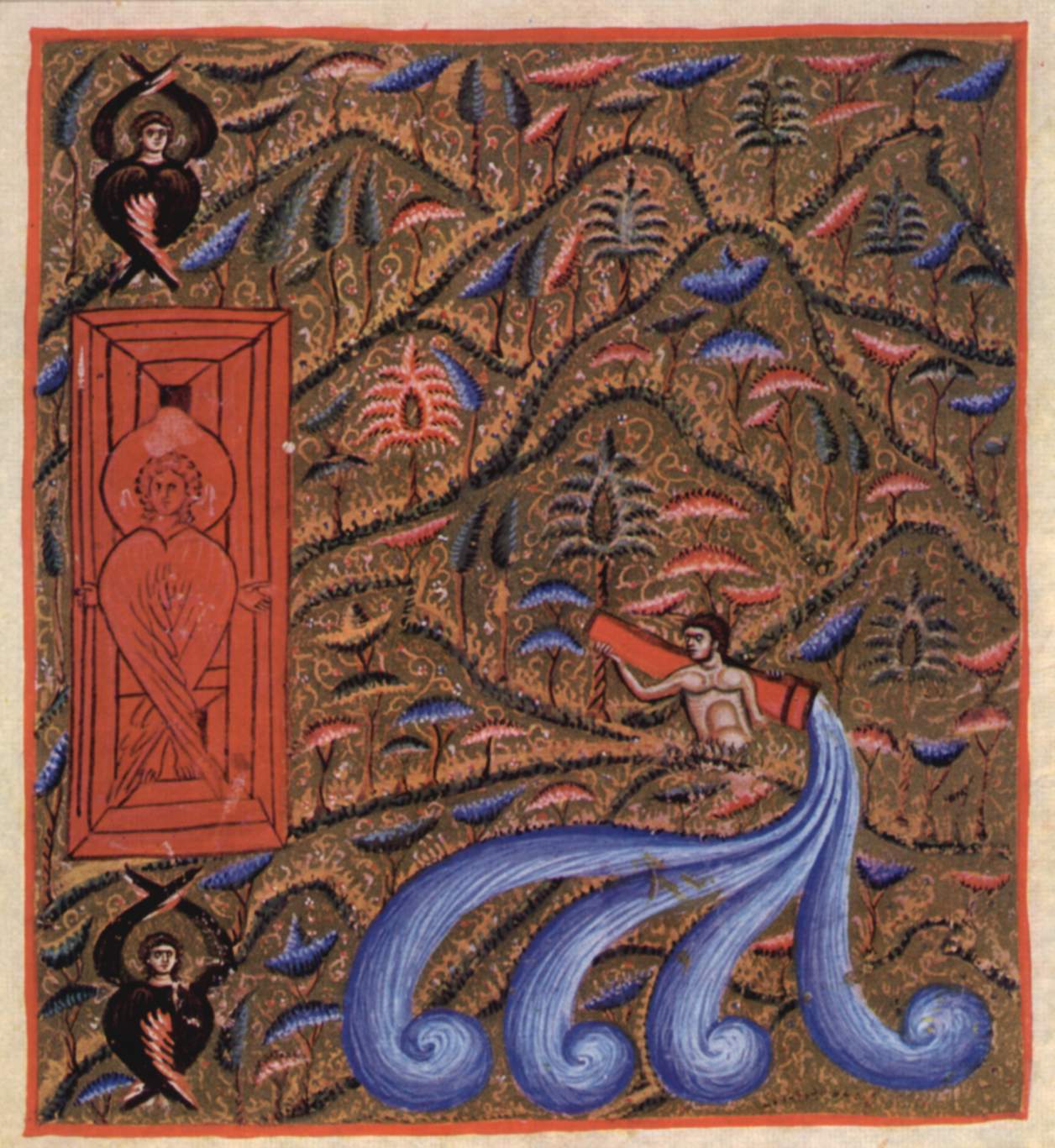Jesuit General Superior Fr. Arturo Sosa promulgated the Universal Apostolic Preferences for the next decade. He summarized them in this video.
St. Ignatius of Loyola learned to find fruit, that is, the effect or consequence of action. More important than our actions is the action of God in, with and for humans. One grows to find fruit and to offer it the more one savors one's own life and all creation. I hope my posts help you feel that finding fruit is a profitable way of living.
Wednesday, February 20, 2019
Saturday, February 16, 2019
Mind Bursting
M
ystical fervour is not a luxury. Without it morality would become repression, asceticism, draught, docility drowsiness, religious practice a pretentious routine, or worse, fear.”
—Henri de Lubac, S.J.
Sacred Moments for Every Day: A Perpetual Calendar for Your Spiritual Journey, Jesuits of Upper Canada, Toronto: Novallis, 2006, 13 February.
___________________
Wiki-image Free Art License
Wednesday, February 13, 2019
Daily word, 13 Feb 19
Fifth Wednesday of the Year (13 Feb 2019)
Homily of Fr. Paul Panaretos, S.J., 8-day retreat
Mystery and Our Mysteries
Creation of humans may readily evoke Genesis’ first presentation of creation we heard yesterday. The second account enriches images of God—and us. Contrasting the rhythms in the accounts may help. The rhythms of Chapter 1 are elegantly simple: God said…and there was; evening and morning followed—the first day1 and each succeeding one. In Chapter 1 elements are created before plants and animals then humans; and the humans are equals, male and female.
 In this reading from Chapter 2 one human is created before rain watered shrub and grass from the earth. Also God Eternal2 is an artisan-creator forming a human from clay of the ground in contrast to God who only spoke: “Let us make human beings in our image, after our likeness.”3 The humans God creates—we will hear tomorrow—speak and feel. That focuses God’s likeness in whom we are made.
In this reading from Chapter 2 one human is created before rain watered shrub and grass from the earth. Also God Eternal2 is an artisan-creator forming a human from clay of the ground in contrast to God who only spoke: “Let us make human beings in our image, after our likeness.”3 The humans God creates—we will hear tomorrow—speak and feel. That focuses God’s likeness in whom we are made.
Genesis Chapter 1 and Chapter 2 contrast the ideal and the actual condition of creation and us.4 That may be happening in our prayer: God may be a bit nearer our minds and hearts. We may be encountering God personally forming us and not distant from our lives. Those and more reveal God as Mystery in whom we discover ourselves.
Mark’s gospel offers Jesus as Mystery. Jesus told his disciples, The mystery of the kingdom of God has been granted to you.5 The mystery is no problem to solve; it is the person of Jesus. Mystery & person: we may rarely align them. It may help to consider a person each of us knows reasonably well. The person I bring to mind I cannot know fully. Another will always surprise, astonish or bewilder us: whether on occasion or, as with some, most of the time. Why would we think it different with Jesus? Part of it is how many in the gospels named Jesus.
Jesus is so often addressed as Teacher in Mark’s gospel that we may think we are supposed to understand him. Jesus, though, is a strange sort of teacher in Mark’s gospel. Rather than persuade his questioners he issued pronouncements: You nullify the word of God in favor of your tradition that you have handed on. You do many such things.6 Jesus repeated himself to his disciples when they ques-tioned him about his parable: he elaborated a bit but not much. His disciples did not need to be persuaded; yet with them Jesus deflected understanding: Are even you likewise without understanding? They were not given understanding; Jesus gave them himself! Like them we can keep receiving him in the varied way Jesus gives himself to us. Like every relationship one with Jesus evolves as it grows.
Being with Jesus as with a friend or another we trust and who trusts us is not beyond us. We may need courage and be deliberate. When we are courageous and deliberate we enjoy a felt-knowledge, an intimate communion. Our knowing communion may escape words; it won’t escape us.
Relationship with the divine is encounter not mere head-knowledge. To encounter one who accepts us completely; who formed me from before I can remember; and who transforms me each moment offers assurance that understanding is unable to offer. Keep giving yourselves to the encounters with the Eternal One who was born in time for us; share what you feel and free yourself to be transformed by Mystery into your mystery. share what you feel to free yourself to be transformed by Mystery into your mystery. That will make your drive to Guelph worth it!
___________
- Genesis 1.3, 5.
- The Jewish Publication Society translation that is faithful to the Hebrew and helpful to moderns. W. Gunther Plaut & David E. Stein, eds. The Torah: A Modern Commentary, Revised. Accordance electronic ed., (New York: Union for Reform Judaism, 2006).
- Genesis 1.26.
- The Torah: A Modern Commentary, Revised, pp. 17-18.
- Mark 4.11.
- Mark 7.13 from yesterday’s gospel reading.
___________
Wiki-images Paradise and Jesus Teaches by the Sea PD-US
Tuesday, February 12, 2019
Subtle, Effective, Catholic
 Tolkien is one of the principal people who aided me in becoming Catholic,” David Russell Mosley wrote. He also excerpted a letter Tolkien wrote to his son about how the elder Tolkien “found the light after the horrors of war.” It appeared in this month’s U.S. Catholic.
Tolkien is one of the principal people who aided me in becoming Catholic,” David Russell Mosley wrote. He also excerpted a letter Tolkien wrote to his son about how the elder Tolkien “found the light after the horrors of war.” It appeared in this month’s U.S. Catholic.
____________
Wiki-image by Julian Nitzsche CC BY-SA 3.0
Monday, February 11, 2019
Daily word, 11 Feb 19
Fifth Monday of the Year (11 Feb 2019) Gn 1. 1-19; Ps 104; Mk 6. 53-56
Homily of Fr. Paul Panaretos, S.J., 8-day retreat
God’s Self-Expression
Before mass: The Second Vatican Council stated something fitting: faith and science are not opposed—they are different but not opposed.1 It is fitting for us because we begin to hear faith’s view of creation. Science is about real, tangible, measurable things; faith points us to what we cannot measure and is more real, more vital.
———————————
.jpg/1024px-Hubble_Peers_into_the_Storm_(29563971405).jpg) In our creeds we profess God makes heaven and; earth and all things visible and; invisible2: God does this daily, Psalm 104 sings. “Creation is the bodily expression of God’s spirit.”3 Creation has need of stewards. Our Creator has given us God’s self-expression not as slavish stewards but partners with God. Supporting creation, working with it for our good and the good of others, preserving it as our common home4 allow us to make a return of love to God more readily.
In our creeds we profess God makes heaven and; earth and all things visible and; invisible2: God does this daily, Psalm 104 sings. “Creation is the bodily expression of God’s spirit.”3 Creation has need of stewards. Our Creator has given us God’s self-expression not as slavish stewards but partners with God. Supporting creation, working with it for our good and the good of others, preserving it as our common home4 allow us to make a return of love to God more readily.
Creation is grand mystery. God creates every moment, and God’s motive is for us—our good: grander mystery. Poetry addresses mystery well because poetry freely sets aside physical laws and plumbs hearts; enlightens minds to notice what is always present yet readily overlooked; poetry sets hearts soaring on updrafts of joy that condors can never pilot with their magnificent wings; poetry gives humans taste and longing for every fruit of cooperation, conserving, companioning.
Clothed in human poetry Genesis speaks God to us. Indeed, the rhythm of God creating begins with speaking: When God was about to create, all was darkness and formless: God spoke, Light…God saw the good light. God separated [out] light from the darkness. God called the light day and darkness night.
God’s rhythm of speaking, seeing, separating and calling reveals desire, intention, clarity, collaboration. Light; water; land; vegetation; heavenly luminaries: all are God’s self-expression. All that existed was God’s spirit—the word we translate wind also means spirit. Creation is the bodily expression of God’s spirit; the poetic words of God creating will continue this week.
.jpg/1024px-2017-365-76_The_Sun_Provides_(33330973662).jpg) If we linger longer with God’s rhythm of self-expression and God’s desire, intention, clarity, collaboration, may we not notice God creating us on our retreats? God creates us every moment—why we exist, as Bernie reminded us here. Is our retreat living with its prayer times offering us clearer light? Are our retreats freeing us to separate essential from non-essential? to notice how we share God’s self-expression? Are we allowing God to water wastelands within, to cultivate new life and to let us see our good selves?
If we linger longer with God’s rhythm of self-expression and God’s desire, intention, clarity, collaboration, may we not notice God creating us on our retreats? God creates us every moment—why we exist, as Bernie reminded us here. Is our retreat living with its prayer times offering us clearer light? Are our retreats freeing us to separate essential from non-essential? to notice how we share God’s self-expression? Are we allowing God to water wastelands within, to cultivate new life and to let us see our good selves?
Noticing the manifold ways God creates us restores us to our true selves. Retreat unites us to that varied assembly of people who sought to touch the tassel on Jesus’ cloak and. . .were made well, made whole. Made well and its cousin, healed, always return us to ourselves. The self-expression God began and continues God will fully restore as surely as evening comes and morning follows. On your retreats continue to fall into the mystery of God creating you so you may feel truly alive and behold God with clearer, inmost sight.
___________
- The Church in the Modern World, Ch. III, esp. ##35-36.
- A teacher’s words I always remember; later they were published. Luke Timothy Johnson, The Creed: What Christians Believe and Why it Matters, 2004: The Crown Publishing Group. Kindle Edition, p. 326.
- Apostles’ Creed and Nicene Creed, respectively.
- Pope Francis favoured the expression in Laudato si!—13 times throughout his encyclical, subtitled On Care For Our Common Home.
___________
Wiki-images Hubble Peers into Storm by NASA CC BY 2.0; Sun Provides CC0 1.0
Subscribe to:
Posts (Atom)

_-_James_Tissot_-_overall.jpg)